What do plumbers actually do
by siteadmin

Plumbers are specialists in the installation and repair of pipes that transport water and waste between homes, businesses, and chemical plants. Plumbers not only install pipes but also plumbing fixtures, such as bathtubs and toilets, and appliances like dishwashers.
Plumbers usually undergo years of apprenticeship before becoming certified. They are able to read blueprints and understand building codes. They also communicate well with customers and their fellow tradesmen.
Installation
Plumbers install pipes for the supply and removal of waste water and gases from homes and business, as well fitting fixtures such bathtubs. toilets, sinks. dishwashers and hot water heaters. Some plumbers have a specialisation in commercial and industrial pipe systems.
Plumbers have to make sure they can access all pipes that need repair before installing new plumbing systems. This may mean moving furniture or covering walls. A whole-house repipe might take several weeks. During that time, the water will be turned off.
All plumbers face similar risks, despite the fact that their jobs may vary. Plumbing service poses risks such as exposure to hazardous substances and heavy lifting.
Repair
Plumbers use different tools to fix pipes, drains and fixtures. They inspect the system to identify any problems and determine how to proceed. For instance, depending on severity, they may have clear clogs away, clean drains or even replace broken parts.
Leaky pipe repairs are among the most common plumbing problems. While homeowners may try to patch up leaks with sleeves or other DIY solutions, plumbers usually replace the pipes to prevent further damage. They can also help with other issues like bad tasting water or installing water softeners.
Plumbers are often called in to repair your main waterline, which connects your street with your house underground. This task usually requires more experience as it involves working in potentially hazardous environments, such as sewer or tank outlets.
Maintenance
Routine maintenance is important to ensure that pipes operate safely and according to design. Specialists use hand and power tools as well testing equipment and test equipment to inspect gas and water pipelines as well fixtures such as sinks bathtubs toilets and dishwashers. They use blueprints to determine where to place pipes and work with architects and contractors to integrate plumbing seamlessly in new projects.
Plumbers sometimes respond to emergency calls, both from homeowners and businesses. This is often done within a very short timeframe. They must be able to diagnose and fix problems quickly, such as adjusting the pressure in pipes or clearing out blockages. Hard hats are often required when working in tight areas.
Customer Service
Installing, inspecting, maintaining, and repairing pipes to bring water into homes or businesses, and transporting waste away, plumbers provide excellent customer service. Plumbers may also install fixtures such a bathtubs sinks toilets or appliances like washing machines, dishwashers. They train apprentices to use these systems as well.
Plumbers are often among the highest paid construction professionals. They earn salaries above average and join labor unions in order to negotiate benefits and wages on their behalf. To become your own plumber, you'll need to complete either a training program or an apprenticeship. You will also need to meet the licensing requirements of your jurisdiction. If you are interested in advancing, you should look for additional certifications. You can also pursue management positions.
Plumbers are specialists in the installation and repair of pipes that transport water and waste between homes, businesses, and chemical plants. Plumbers not only install pipes but also plumbing fixtures, such as bathtubs and toilets, and appliances like dishwashers. Plumbers usually undergo years of apprenticeship before becoming certified. They are able to read blueprints and…
Recent Posts
- Leading the Way in Air Conditioning Services in Provo, UT
- The Amp Solar Company: Illuminating Salt Lake City with Sustainable Energy Solutions
- The Amp Solar Company: Illuminating Salt Lake City with Sustainable Energy Solutions
- Nathan Premier Basement Finishing: Elevating Home Spaces in Lehi
- Understanding the Benefits of Quartz Countertops for Your Home Renovation Project
